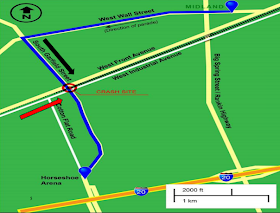(Photo: Midland Police Department, reproduced in NTSB presentation)
Setting: Grade crossing in Midland, TX.
Time: 4:35 pm, November 15, 2012.
Incident: A street parade was being held to honor veterans that afternoon, escorted by emergency vehicles that protected the street intersections against cross traffic. The latter portion of the route crossed a busy set of Union Pacific railroad tracks at grade level on South Garfield Street, and ended at an arena on the south side of the tracks (Map, NTSB):
The float was a semi-trailer rig, which was moving along the route with law-enforcement escorts. Its flatbed trailer carried 24 veterans and spouses seated in chairs. Before the crossing gate came down, the rig driver approached the crossing started moving slowly across the tracks, paying particular attention (via a rear-view mirror) to how his passengers were coping with a dip in the road short of the grade crossing.
A Union Pacific freight train (four locomotives pulling 84 loaded cars) approached the crossing at a speed less than allowed (62 mph, speed limit of 70 mph).
The engineer saw the semi starting to cross, applied emergency braking and sounded his air horn, but could not stop in time and hit the rear end of the trailer, pushing it from the intersection. In all, the train required nearly a mile to stop.
The crossing gates and alarms had triggered within the required time, at least 20 seconds in advance. The crossing gate came down on the flatbed.
Original post on Disaster-Wise is here.
Effects: Four float passengers died, and five passengers were seriously injured. Eight other float passengers and a deputy sheriff at the site sustained minor injuries. Seven float passengers suffered no injuries.
Report: The NTSB's findings and a slide presentation are linked here.
Probable cause: In general, a failure to anticipate foreseeable risks and manage them through the permitting process. The truck driver assumed that since law enforcement was protecting the street intersections for the floats, it was also managing risk of collision with the two dozen trains that passed through daily. Another factor was that parade drivers had been passing through red traffic signals already at other intersections, so a red signal at the grade crossing did not raise concerns.
Instead of being alert about the possibility of an approaching train as Midland motorists would be under normal conditions, the driver deferred to law enforcement officials along the route. While at the crossing he focused his attention in his tractor's rear-view mirror, looking at the float passengers and how they were handling a rough part of the road. The train's air horn was also hard to hear given noise along the parade route, including the use of a train-like air horn mounted on the parade's lead vehicle.
Summary from the report:
"The National Transportation Safety Board (NTSB) determines that the probable cause of this collision was the failure of the city of Midland and the parade organizer,“Show of Support, Military Hunt, Inc.” (Show of Support), to identify and mitigate the risks associated with routing a parade through a highway–railroad grade crossing. Contributing to the collision was the lack of traffic signal cues to indicate to law enforcement that an approaching train had preempted the normal highway traffic signal sequence at the intersection of South Garfield Street and West Front Avenue. Further contributing to the collision was an expectancy of safety on the part of the float driver, created by the presence of law enforcement personnel as escorts and for traffic control, leading him to believe that he could turn his attention to his side-view mirrors to monitor the well-being of the parade float occupants as he negotiated a dip in the roadway on approach to the grade crossing."
The city of Midland should have required a permit from the parade organizers, and that permit should have had a section on risk management. No permits had been required for such parades from 2009 through 2012. The problem of trains would have come out in such a plan, given that a grade crossing was going to be used, and that 23 trains pass through the city daily. A good review would have withheld the parade permit until the city saw written permission from Union Pacific, which could have held its trains during the parade.
My Comments: The Midland truck-train crash is a classic example of how presumptions affect perceptions, and can keep people from thinking critically. As part of your risk-management process, gather your team before things get busy; list all the foreseeable problems; and describe how the team is going to detect and handle them.



No comments:
Post a Comment